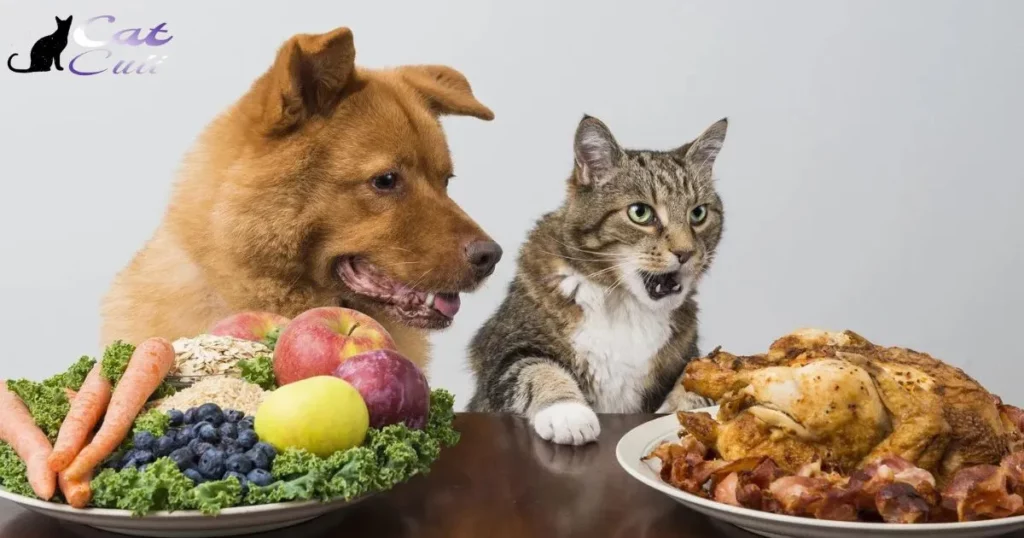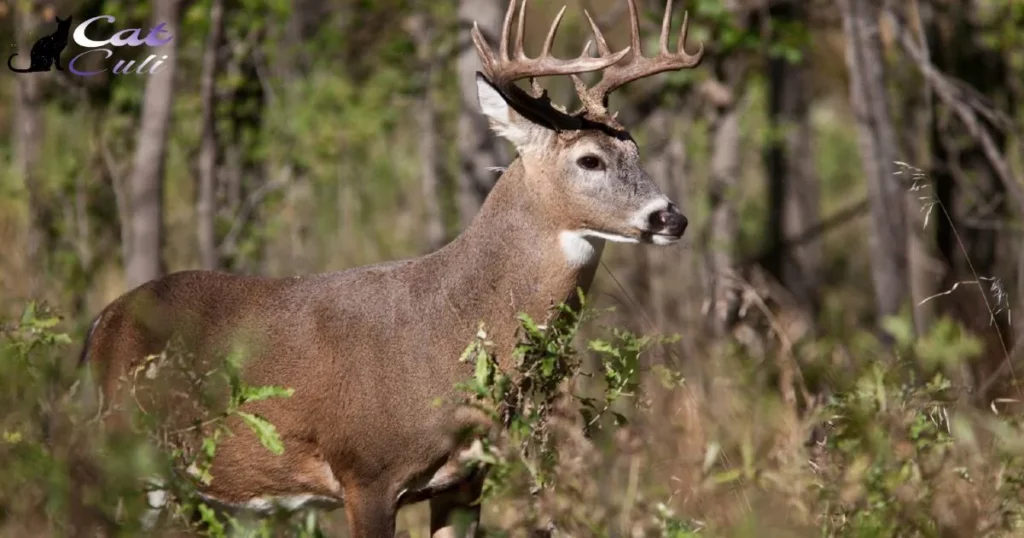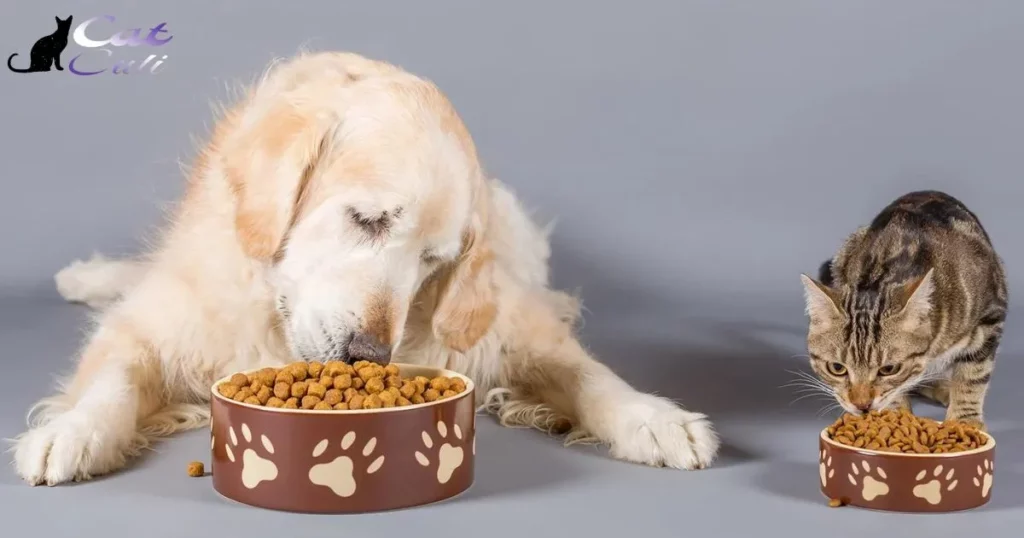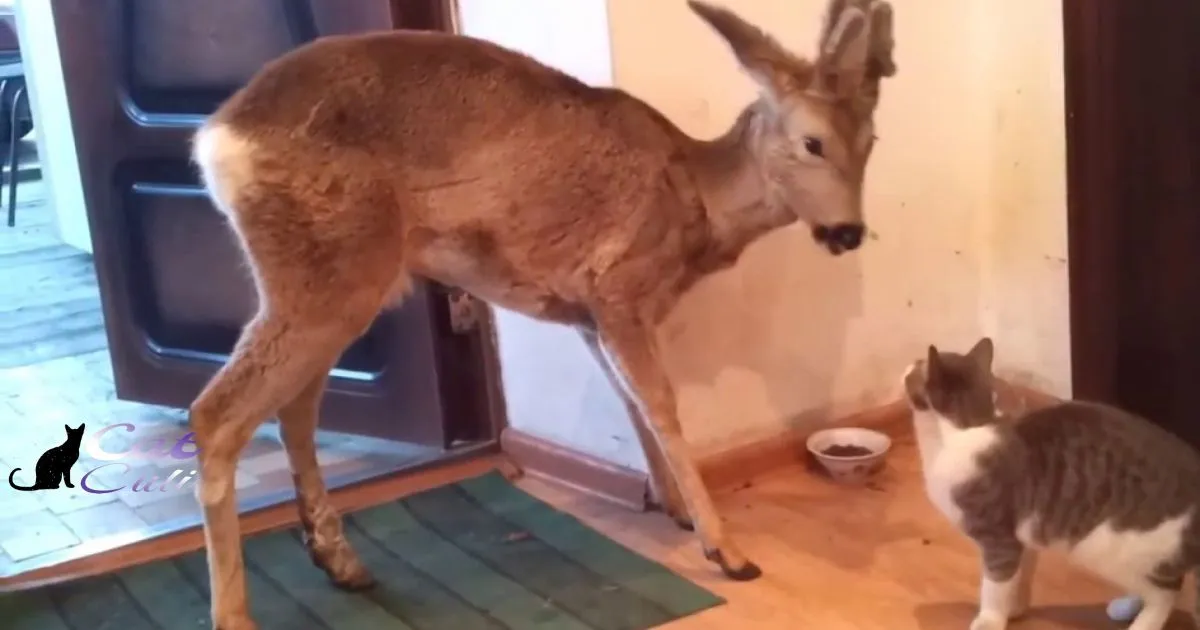Deer are herbivores and primarily feed on plants, leaves, fruits, and grasses in their natural habitat. They do not typically consume cat food as it’s not part of their natural diet. Offering cat food to deer may not be healthy or suitable for their nutritional needs. Deer prefer their natural vegetation and may not be attracted to or inclined to eat cat food if encountered.
Ever wondered, Do deer eat cat food? It’s a curious question that piques our understanding of these creatures’ eating habits. Picture this: a serene garden, a bowl of cat food set out, and inquisitive deer venturing close. Let’s unravel the mystery behind whether these gentle animals have a taste for our feline friend’s cuisine.
Sure, deer are known to eat a variety of foods, including fruits, nuts, grass, and even birdseed, but they typically don’t seek out cat food. If left accessible, they might nibble on it occasionally. It’s essential to keep this in mind to avoid attracting deer if you have outdoor cat food. Stay with us for more insights into wildlife behaviours and interactions.
What Can I Feed The Neighborhood Deer?
To feed the neighbourhood deer, consider offering items like hay, grains, or deer feed pellets. Fruits like apples or vegetables such as carrots are also favourites among these animals. Ensure the food is placed in a safe spot, away from roads, to avoid accidents.
Feeding the deer can be a delightful way to observe them, but always check local regulations and guidelines before providing food.
Feeding deer means understanding their nutritional needs. Providing appropriate and natural options like vegetation or approved feeds promotes their well-being. Avoid feeding them processed human food, as it can be harmful to their health.
Should You Feed Neighborhood Deer?
Feeding neighbourhood deer might seem kind, but it can disrupt their natural diet and habits. Offering food could attract more deer than the area can support, leading to overpopulation issues. Human-provided food might lack necessary nutrients and upset their digestive systems.
Consider the impact on the local ecosystem before deciding to feed deer. It’s crucial to maintain their natural foraging behaviour for their health and the balance of the environment. Providing appropriate habitats and preserving their natural food sources can better support the deer population without causing potential harm.
What Can I Feed Deer In My Garden?
Feeding deer in your garden can be done with natural plants like clover, alfalfa, and oats. Opt for a mix of fruits and vegetables such as apples and carrots to supplement their diet. Avoid processed foods or bread, as they can be harmful to deer and attract other unwanted animals.
Creating a deer-friendly space involves planting shrubs like rhododendron and yew, which deer typically avoid. Fencing can also protect your garden, though it needs to be at least 8 feet tall to deter deer effectively. Providing a diverse, natural buffet while safeguarding your garden ensures a harmonious coexistence with these graceful creatures.
What Is Safe To Feed Wild Deer?
Feeding wild deer requires caution. Opt for natural foods like grass, fruits, and vegetables. Avoid processed or human foods since they can harm deer health. Keeping their diet natural ensures their well-being in the wild.
Offering safe options like hay, grains, or specially formulated deer feed is advisable. Providing a consistent and balanced diet helps maintain the deer’s health. Additionally, refraining from feeding items like cat food to prevent digestive issues or dependency, similar to concerns with Squirrels Eat Cat Food.
What Can I Feed My Backyard Deer In The Wild?
Feeding backyard deer in the wild requires caution and thoughtfulness. Offer them natural food like fruits, vegetables, and nuts. Avoid processed foods or anything harmful; providing a safe and nutritious environment ensures their well-being.
Plants like clover, apples, carrots, and oats make suitable options. Remember, consistency in their diet and maintaining a safe feeding space fosters a healthy relationship with these beautiful creatures.
Watch Will Deer Eat Dry Cat Food Video
In the video Will Deer Eat Dry Cat Food, viewers witness an intriguing interaction between deer and an unexpected meal. The footage showcases deer exploring and nibbling on dry cat food left outside. It reveals their curiosity and adaptability in seeking food sources, offering a unique perspective on wildlife behaviour.
This video sheds light on the dietary preferences and behaviours of deer when presented with unconventional food options like dry cat food. It’s a fascinating glimpse into how wildlife adapts to various environments and food availability, showcasing the resourcefulness of these animals in their quest for sustenance.
Can Wild Animals Eat Dry Cat Food?

Wild animals occasionally eat dry cat food left outdoors, attracted by its smell and easy accessibility. Raccoons, opossums, and stray cats might find and consume it if available. This food isn’t nutritionally balanced for most wild animals, potentially leading to health issues if it becomes a primary diet.
It’s essential to secure pet food to avoid attracting unintended wildlife visitors.While wild animals can eat dry cat food, it’s not their natural or optimal diet. They may scavenge it when it’s accessible, but it doesn’t provide the necessary nutrients for their well-being.
Consequently, relying solely on cat food can be harmful to wild animals’ health, and it’s advisable to avoid unintentionally feeding them by securely storing pet food indoors.
What Can I Feed The Deer In My Backyard?
If you’re considering what to feed deer in your backyard, opt for natural foods like fruits, vegetables, and grains. These animals enjoy items like apples, carrots, and oats, which provide essential nutrients. Remember to avoid processed foods or items harmful to deer, like bread or crackers, to ensure their health and safety in your backyard habitat.
Another option for feeding deer includes planting deer-friendly vegetation such as clover, alfalfa, or soybeans. These plants not only serve as a food source but also contribute to the deer’s natural diet. Creating a welcoming environment with suitable food options can encourage deer to frequent your backyard while respecting their dietary needs.
What Should You Not Feed Deer?
Deer shouldn’t consume corn, as it’s hard on their stomachs and doesn’t provide essential nutrients. Bread isn’t suitable either; it lacks the necessary nutrients and can lead to digestive issues. Avoid feeding deer fruits high in sugar, like apples, as these can upset their digestive systems.
Feeding deer food high in carbohydrates, such as crackers or chips, can harm their health. Processed foods like these lack the nutrients deer need and can cause digestive problems. Steer clear of mouldy or spoiled food, as it can be toxic to deer and pose serious health risks.
Can Wild Deer Eat Dry Cat Food?
Wild deer can consume dry cat food when it’s available. They’re known to forage for a variety of foods, and cat food can be an enticing option due to its scent and taste. It’s crucial to note that cat food isn’t an ideal or natural dietary component for deer and should not replace their natural diet of plants, leaves, and grasses.
Offering cat food to wild deer can potentially disrupt their nutritional balance and natural feeding habits.Deer might occasionally sample dry cat food if it’s accessible, drawn by its aroma and easy availability.
Their primary diet consists of vegetation found in their natural habitat, which should be the mainstay of their nutrition. Introducing cat food to wild deer diets could interfere with their digestive system and may not provide the essential nutrients they require for optimal health.
What Foods Are Toxic To Deer?
Certain foods can be harmful to deer, affecting their health. Avoid feeding them items like chocolate, which contains substances toxic to deer. Plants like rhubarb and certain fruits with pits should also be kept away as they can pose risks to their well-being. It’s crucial to be mindful of what you offer to deer to ensure their safety and health.
Among the toxic foods for deer are those that are rich in sugars or salts. Foods such as corn, bread, and other processed human foods might seem harmless but can lead to health issues in deer. Steering clear of these items is essential to maintain the natural and healthy diet of these animals in the wild.
Will Whitetail Deer Eat Dry Dog Food?
Whitetail deer may consume dry dog food when it’s accessible. They’re adaptable creatures known to forage on various food sources, including grains and certain pet foods left outdoors. Deer are opportunistic and might nibble on dry dog food if it’s within their reach.
While whitetail deer might sample dry dog food, it’s not their typical or preferred diet. They primarily rely on natural vegetation, and while they may opportunistically try pet food left outdoors, it’s not a significant part of their nutritional intake. Deer prefer a diet rich in plants and shrubs found in their natural habitat.
What Can You Feed Wild Deer?

You can feed wild deer a variety of foods, such as fruits like apples and pears, as well as vegetables like carrots and sweet potatoes. These foods provide essential nutrients and can supplement their natural diet.
It’s crucial to avoid offering foods that are harmful to deer, like bread, crackers, or processed human foods, which can negatively impact their health.Another option is to provide deer with grains like oats or corn in small quantities.
These grains can be scattered in a feeding area to supplement their diet, but it’s important not to overfeed or rely solely on grains, as they lack essential nutrients for deer’s health. Offering a balanced mix of natural foods can help support wild deer while ensuring they maintain a healthy diet in their natural habitat.
What Wild Animals Will Eat Cat Food?
Wild animals, like raccoons and opossums, often feast on cat food left outdoors. They’re attracted by the scent and easy accessibility of the food. These creatures, known for their scavenging abilities, consider cat food a convenient meal, especially when it’s left unattended outside.
Bears, foxes, and even stray dogs are also known to consume cat food if it’s within their reach. The strong smell of the food can lure these animals, leading them to venture closer to residential areas. Securing pet food indoors or in tightly sealed containers helps prevent attracting wild visitors seeking an easy snack.
The Best Ways To Feed Your Dee
| Feeding Method | Description |
| Scheduled Meals | Offering specific meals at set times during the day for routine feeding |
| Free-Feeding | Keeping food available at all times for the pet to eat at their leisure |
| Portion Control | Measuring precise amounts of food per meal to manage intake |
| Interactive Feeding | Utilizing puzzles or toys that dispense food to stimulate mental activity |
Is Dry Cat Food Safe For Wildlife?
Dry cat food poses risks to wildlife if left outdoors. When uneaten, it attracts animals like raccoons, squirrels, or even birds. These animals might consume the food, leading to potential health issues or dependency on human-provided food sources.
To keep wildlife safe, store dry cat food indoors and ensure outdoor feeding areas are monitored and cleaned promptly. Responsible disposal of uneaten food helps prevent unintended harm to the surrounding wildlife populations.
Can Squirrels Eat Dry Cat Food?
Squirrels can eat dry cat food without harm, but it shouldn’t be a staple in their diet. This food contains nutrients beneficial for cats but might not fulfill a squirrel’s dietary needs. Offering it occasionally as a snack is okay, but a squirrel’s main diet should consist of nuts, fruits, vegetables, and seeds.
Introducing dry cat food to squirrels may pique their interest, but moderation is key. While it’s not harmful in small amounts, relying solely on this food could lead to nutritional deficiencies in squirrels, impacting their health negatively. Thus, it’s best to provide a diverse diet that suits a squirrel’s natural eating habits.
Is It Ok For Deer To Eat Dry Cat Food?
Sure! Here are two short paragraphs about deer eating dry cat food:
Deer eating dry cat food isn’t harmful. They’re known to occasionally snack on it due to its high protein content. Some people place cat food in their yards, inadvertently attracting deer, but this doesn’t pose a significant risk to the deer’s health.
It’s essential to note that cat food shouldn’t become a primary diet for deer as it lacks some nutrients vital for their overall health. Therefore, while it’s okay for deer to nibble on dry cat food occasionally, it’s best for them to consume their natural diet for proper nutrition.
Will Deer Eat Cat Or Dog Food?

Deer are known to eat almost anything available, including cat or dog food left outside. They’re attracted to the scent and taste of these foods, especially if placed in accessible areas.
It’s essential to keep pet food indoors or stored securely to prevent attracting wildlife like deer, ensuring the safety of both your pets and the surrounding wildlife. Always supervise your pet’s mealtime outdoors to avoid potential encounters with curious deer
What Is The Cheapest Thing To Feed Deer?
When it comes to feeding deer economically, corn stands out as one of the cheapest options. Its affordability and availability make it a popular choice among deer enthusiasts. Another budget-friendly alternative is soybeans, offering nutritional value at a reasonable price point.
For an economical feeding approach for deer, exploring natural forage can be incredibly inexpensive. Acorns, fruits, and native plants in their habitat often serve as readily available and low-cost feeding options. Utilizing these natural resources can be a wallet-friendly way to support the dietary needs of deer without hefty expenses.
Cheap Alternatives To Feeding Deer Corn
- Soybeans: A cost-effective alternative to feeding deer, offering nutritional value similar to corn.
- Sweet Potatoes: Affordable and rich in nutrients, these can be a cheap yet healthy option for deer.
- Pelleted Feeds: Consider pelleted feeds as an economical choice, often comprising a blend of grains and supplements.
- Forage Crops: Growing specific plants like clover or turnips can provide inexpensive, natural options for deer feed.
- Acorns and Fruits: Utilize the natural environment by offering acorns, fruits, and native plants as economical deer feed alternatives.
What Should You Not Feed Deer?
Feeding deer requires caution to ensure their health and safety. Avoid feeding them foods like bread, chips, and cookies as these lack essential nutrients and can upset their stomachs. Steer clear of feeding deer processed foods or anything containing preservatives, as these can harm their digestive systems.
Opt instead for natural foods like fruits, vegetables, and leafy greens. These provide necessary nutrients and are easier for deer to digest. Also, avoid leaving out salty foods, which can dehydrate the deer and lead to health issues. Keeping their diet natural and free from processed or harmful items is key to supporting their well-being.
Is It Ok To Feed Wild Deer?
Feeding wild deer can seem kind, but it’s not always advisable. Directly providing food can disrupt their natural foraging behaviours and diets, causing health issues. Human foods like bread or crackers might lack proper nutrients, leading to malnutrition or digestive problems for deer.
While it might feel compassionate, feeding wild deer can cause unintended harm. Altering their diet and habits can make them reliant on handouts, affecting their ability to find food naturally. Congregating deer in one area can spread diseases more easily among them. It’s best to let these majestic creatures fend for themselves in their natural environment.
Why You Shouldn’t Feed Deer In Winter?
Feeding deer in winter seems helpful, but it can harm them. When deer rely on human-provided food, they struggle to forage naturally, affecting their ability to survive. This dependency disrupts their natural behaviour and can lead to malnutrition or illness, making it important to avoid feeding deer in winter.
Human feeding can lure deer into dangerous situations. When deer congregate in one spot for food, it increases the risk of spreading diseases among them. Attracting deer to populated areas heightens the chance of accidents involving vehicles, posing a threat to both deer and drivers.
What Kind Of Feed Attracts Deer?
Certain feeds attract deer more than others. Corn, soybeans, and alfalfa are known to be highly appealing to deer due to their nutritional value. Fruits like apples and pears, as well as vegetables such as carrots and turnips, can also entice deer to frequent specific areas.
Deer are attracted to feed with strong aromas and flavours. This includes grains like oats and wheat, which emit scents that draw deer. Understanding these preferences can help when choosing the kind of feed to attract and sustain deer in specific habitats or areas.
What Feed Attracts Deer The Most?
Deer are particularly drawn to feeds with high nutritional value, such as corn, soybeans, and alfalfa. These feeds provide essential nutrients and are highly appealing to deer, often attracting them to specific areas where these feeds are available.
What Food Do Deer Find Irresistible?
Deer find certain fruits like apples and pears, as well as vegetables such as carrots and turnips, irresistible. These foods, rich in natural sugars and nutrients, entice deer due to their strong flavours and aromas.
What Food Attracts Deer To Your Yard?
To attract deer to your yard, consider offering grains like oats and wheat, which emit scents that attract deer. Additionally, planting fruit trees or creating feeding stations with preferred foods like corn can significantly increase the chances of deer frequenting your yard.
What To Feed Deer In Backyard
Feeding deer in your backyard can be a delightful way to connect with wildlife. You can provide them with natural foods like fruits, vegetables, and grains, ensuring a diverse and nutritious diet. Offering deer-specific food like corn, oats, and apples can attract them while avoiding processed human foods that might harm their health.
Providing a consistent and reliable food source is crucial for the deer’s well-being. Placing feed in designated areas away from roads or potential dangers helps maintain their safety. Considering local regulations and guidelines about feeding wildlife is essential to ensure you’re contributing positively to their health and habitat.
FAQ’s
Does deer eat cats?
Deer typically don’t hunt cats. They’re herbivores, feeding on plants, leaves, and grass.
What do most deer eat?
Deer mainly dine on plants, grass, leaves, fruits, and sometimes fungi. They’re herbivores.
Can I feed my cats deer meat?
Yes, you can. Ensure it’s properly prepared and cooked to avoid health risks for your cats.
Do deer eat any human food?
Deer mostly stick to their natural diet. Occasionally, they might nibble on crops like corn or garden plants.
Conclusion
In conclusion, the question: Do Deer Eat Cat Food? raises curiosity about the dietary habits of deer. Typically, deer are herbivores, consuming plants, leaves, and grass as their primary diet. Cat food, being a manufactured product, isn’t a natural part of a deer’s diet. Deer don’t actively seek out or consume cat food in their usual feeding patterns.
Understanding the eating habits of deer helps clarify that their diet mainly consists of vegetation, distinguishing their feeding preferences from items like cat food. While deer may occasionally investigate unfamiliar scents or food sources, the likelihood of them regularly consuming cat food remains extremely low.








